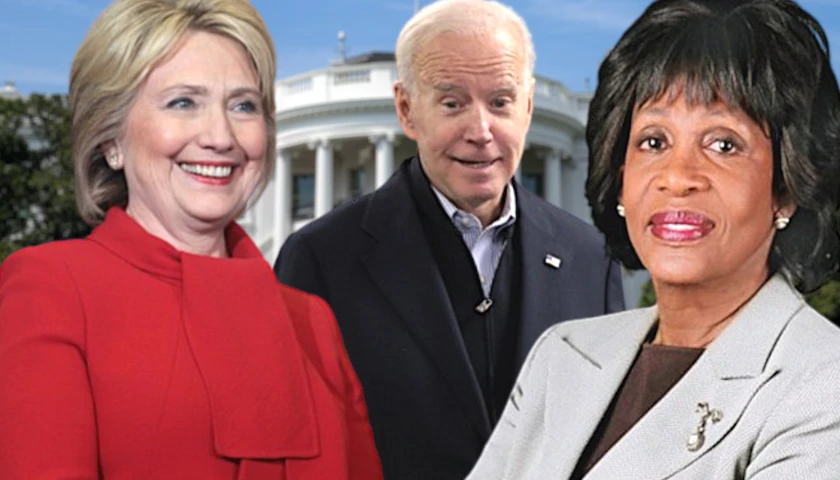by Daniel Oliver
How do the Democrats complain? Let us count the ways.
In January 2017, seven House Democrats (Jim McGovern, Jamie Raskin, Pramila Jayapal, Raul Grijalva, Sheila Jackson Lee, Barbara Lee, and Maxine Waters) formally objected to the certification of state elections.
In announcing their challenge, Barbara Lee claimed that factors such as “malfunctioning voter machines” and “incidents of intimidation and misinformation at the polls” were “clear evidence of widespread voter suppression.”
Jamie Raskin claimed that the 2016 election was “badly tainted by everything from cyber-sabotage by Vladimir Putin to deliberate voter suppression by Republicans in numerous swing states.” Ah, yes, that wily old Vladimir Putin—he’s a clever guy, he is.
No senators were persuaded by the House Democrats’ arguments, meaning that the election challenges did not move forward.
Democratic Congressman John Lewis (also a “civil rights activist”) did not attend Trump’s inauguration, saying that he did not “see this president-elect as a legitimate president.”
In January 2017, Senator Bernie Sanders dodged a question about whether Trump was a legitimate president, responding that Trump would “be inaugurated” but that he had “great concerns about the role that Russian hacking played in getting him elected.” Right. Those wily Russians again.
In January 2017, Jerry Nadler, former chairman of the House Judiciary Committee, said Trump’s election was “illegitimate.” Said Nadler: “He was legally elected, but the Russian weighing-in on the election, the Russian attempt to hack the election and, frankly, the FBI’s weighing-in on the election, I think, makes his election illegitimate, puts an asterisk next to his name.” Да, правильно.
In January 2017, Democratic National Committee Chairman Debbie Wasserman Schultz dodged questions about Trump’s electoral legitimacy in a CNN interview: “What I believe is that there’s no question that the outcome of this election was affected by . . . Russian interference.” (You can’t make this stuff up!)
At a campaign rally in May 2019, Joe Biden (the same Joe Biden who is now the U.S. president) said he “absolutely agreed” with an audience member calling Trump an “illegitimate president.”
Hillary Clinton has repeatedly questioned Trump’s electoral legitimacy.
In September 2017, Clinton claimed she “would not” rule out questioning the legitimacy of the 2016 election but that she “just [didn’t] think we have a mechanism” for challenging the results. Understandably, perhaps, she didn’t raise the Russian interference issue. Wonder why not.
In September 2019, Clinton said that Trump “knows he’s an illegitimate president” and that “he understands that the many varying tactics they used, from voter suppression and voter purging to hacking to the false stories . . . were just a bunch of different reasons why the election turned out like [sic] it did.”
In July 2020, Clinton claimed “the one thing that Trump is fearful of” is that Americans “will see how illegitimate his victory actually was.”
In October 2020, Clinton told The Atlantic that “there was a widespread understanding that [the 2016] election was not on the level. We still don’t know what really happened.”
In January 2005, 31 House Democrats voted to reject Ohio’s electoral votes after Senator Barbara Boxer (D-CA) filed a challenge to the state’s electors.
Democrats voting to reject Ohio’s electors claimed that the action was necessary to address “numerous, serious election irregularities” that led to “a significant disenfranchisement of voters.”
House Democrats voting yes on the motion included Barbara Lee (D-CA), Maxine Waters (D-CA), now House Democratic Leader James Clyburn (D-SC), and now Senator Ed Markey (D-MA).
In 2006, DNC Chairman Howard Dean claimed that he was “not confident that the election in Ohio was fairly decided. . . . We know that there was substantial voter suppression, and the machines were not reliable. That’s clear.”
Senators voicing support for the motion to challenge Ohio’s electors included Senator Dick Durbin (now Senate Majority whip) and Chris Van Hollen (D-MD).
Durbin: “Some may criticize our colleague from California for bringing us here for this brief debate. I thank her for doing that because it gives members an opportunity once again on a bipartisan basis to look at a challenge that we face not just in the last election in one State but in many States.”
Van Hollen: “I believe that Senator Barbara Boxer (D-CA) and Representative Stephanie Tubbs Jones (D-OH) have performed a very valuable public service in bringing this debate before the Congress.”
In 2004, Rep. Jerry Nadler repeatedly argued that voting machines and paper ballots were subject to fraud that needed investigation. In November 2004, he said: “We are requesting an investigation into all the allegations of irregularities with respect to the electronic and other voting machines. . . . Paper ballots are extremely susceptible to fraud.” He has got to be kidding!
And of course, there’s Stacy Abrams; she still maintains she won the election for governor of Georgia in 2018.
All these complaints by Democrats, election loss after election loss—where was Liz Cheney when we needed her?
Now it turns out Biden officials are already preparing to contest the upcoming election if Biden loses. But you can bet your bottom (badly inflated) dollar that they will beat up on Trump if he contests the election if he loses.
Another election was stolen? Pass the pie, please.
– – –
Daniel Oliver is Chairman of the Board of the Education and Research Institute and a Director of Pacific Research Institute for Public Policy in San Francisco. In addition to serving as Chairman of the Federal Trade Commission under President Reagan, he was Executive Editor and subsequently Chairman of the Board of William F. Buckley Jr.’s National Review.
Photo “Hillary Clinton” by Gage Skidmore. CC BY-SA 3.0. Photo “Joe Biden” by Gage Skidmore. CC BY-SA 2.0. Photo “Maxine Waters” by Maxine Waters.









